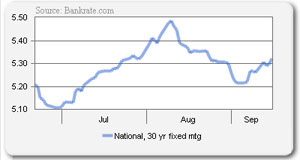Despite the spike in gasoline prices, the drop in retail sales and auto sales and flat core inflation, the Fed still sees that inflation is still a threat. At what point will the bond market come on board? These factors can also make the argument that we are near an economic slowdown and inflation is not a threat. Raising short term rates could further weaken the economy. All this could bode well for mortgage rates if economic conditions remain the same.

The Fed is expected to raise the federal funds rate on Tuesday because it believes the economic malaise that seems to be gaining momentum, is temporary. The bond market seems to agree, seeing a slight 0.01% uptick in mortgage rates over the past two weeks.


